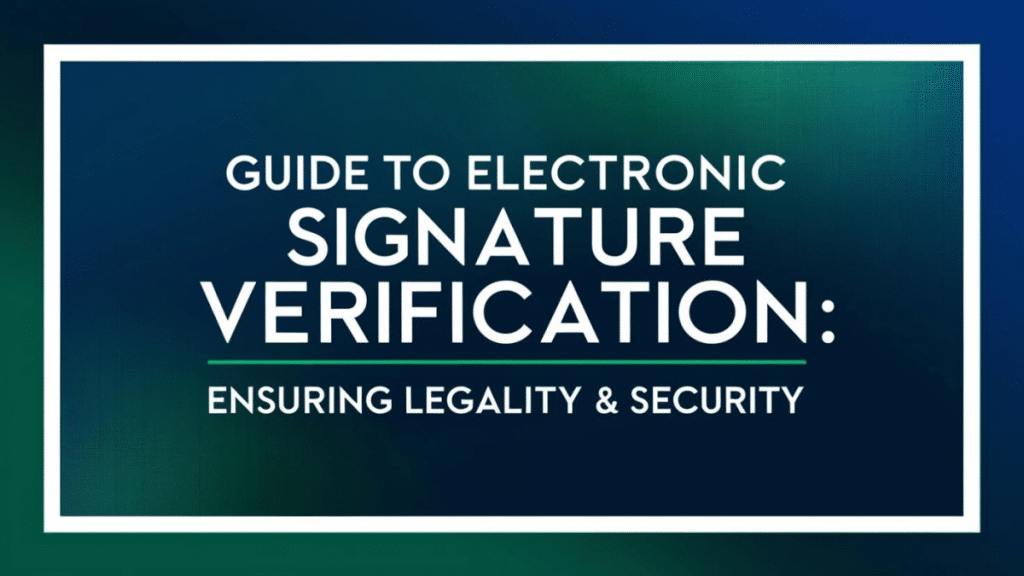In the digital-first business world, electronic signatures (eSignatures) have become a necessity for executing contracts, agreements, and approvals. However, not all eSignatures are created equal—without proper verification, organizations risk fraud, legal disputes, and compliance failures.
A survey by Gartner found that over 20% of digital transactions face security vulnerabilities due to weak authentication mechanisms. Businesses need robust electronic signature verification processes to ensure the authenticity, integrity, and legal enforceability of signed documents.
This guide explores how electronic signature verification works, the risks of unverified eSignatures, the best verification methods, and why enterprises need a secure, API-driven eSignature solution.
Why Electronic Signature Verification Matters
1. Preventing Fraud & Unauthorized Alterations
- Weak eSignatures can be forged or manipulated, leading to contract disputes and financial fraud.
- Unverified eSignatures may allow unauthorized changes to legally binding agreements.
2. Ensuring Legal Compliance
- Regulations like eIDAS (EU), ESIGN Act & UETA (US), and PIPEDA (Canada) require verifiable electronic signatures.
- Without verification, organizations risk contract invalidation, penalties, and lawsuits.
3. Enabling Secure Remote Transactions
- With the rise of remote work, businesses need secure ways to verify signers without in-person meetings.
- eSignature verification ensures authenticity even in cross-border transactions.
How Electronic Signature Verification Works
1. Multi-Layered Authentication
Before signing, users must verify their identity through:
✔ Email & SMS OTP authentication
✔ Biometric verification (face recognition, fingerprint authentication)
✔ Government ID validation for high-value transactions
2. Tamper-Proof Audit Trails
- Every eSignature event logs timestamps, IP addresses, device details, and geolocation.
- This creates a legally admissible digital audit trail that can be used in court if needed.
3. Cryptographic Hashing & Blockchain Verification
- Cryptographic hashing secures documents, making it impossible to alter them post-signing.
- Blockchain-based verification ensures document authenticity with immutable records.
4. Digital Certificates & PKI-Based Signing
- Qualified Electronic Signatures (QES) use Public Key Infrastructure (PKI) to link the signer’s identity to a verified digital certificate.
- This method is widely accepted in government, finance, and regulated industries.
Common Risks of Unverified eSignatures
❌ Legal Disputes & Contract Nullification
- Courts may reject agreements with weak, unverifiable electronic signatures.
❌ Regulatory Non-Compliance
- Failing to meet compliance standards can result in heavy fines or business restrictions.
❌ Identity Theft & Fraud
- Unverified signatures make it easier for cybercriminals to commit fraud, leading to financial loss.
Why Businesses Need an API-Driven eSignature Verification Solution
For enterprises handling high-value transactions, integrating eSignature verification into existing systems is critical. This is where an eSignature API becomes a game-changer.
1. Seamless Enterprise Integration
- eSignature APIs allow organizations to embed verification features into CRMs, ERP platforms, and contract management tools.
2. Automated Compliance Checks
- APIs can automatically validate signatures against global regulatory standards (eIDAS, ESIGN, HIPAA, etc.).
3. Scalable, Real-Time Verification
- Unlike manual verification, an API-driven approach ensures instant validation of eSignatures at scale.
4. Enhanced Security with AI & Blockchain
- AI-powered risk detection identifies suspicious signing patterns.
- Blockchain-based smart contracts ensure document integrity.
Why Certinal is the Best eSignature Solution for Secure eSignature Verification
There are many legacy vendors like DocuSign, most of them lack security features, thus businesses are now looking for DocuSign alternatives due to high costs, lack of flexibility, and limited advanced security features. Certinal offers a more scalable, secure, and cost-effective solution.
🔹 Advanced Verification Features – Certinal ensures multi-factor authentication, audit trails, and biometric verification for unmatched security.
🔹 Seamless API Integration – Works with Salesforce, SAP, Oracle, Microsoft, and other enterprise systems.
🔹 Tamper-Proof Digital Signatures – Uses AES-256 encryption, blockchain verification, and PKI-based signing.
🔹 Regulatory Compliance – Fully compliant with eIDAS, ESIGN Act, UETA, HIPAA, and SOC 2.
🔹 Flexible Pricing – Unlike DocuSign’s rigid pricing, Certinal offers custom plans tailored to enterprise needs.
With Certinal’s eSignature solution, businesses can eliminate fraud risks, ensure seamless contract execution, and meet compliance effortlessly.
Conclusion: Secure Every Signature with Verification
In a world where cyber threats and digital fraud are on the rise, organizations can’t afford to rely on unverified eSignatures. By leveraging advanced eSignature verification, businesses can:
✅ Protect contracts from fraud and forgery
✅ Ensure global regulatory compliance
✅ Streamline enterprise workflows with secure API-driven verification
🚀 Looking for a secure eSignature solution?Get started with Certinal and experience the future of fraud-proof digital signing!
Book a Demo Now!
